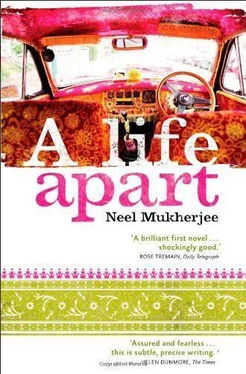‘God?’ she asked in that interrogative tone of hers, which meant that he had got the next word wrong and she wanted to confirm that, or maybe give him a chance to correct it before she brought down the ruler on his exposed arms or legs, he was never sure which.
‘God. . God. . make,’ he murmured, his voice a trembling leaf to the approach of storm. He knew he was getting it wrong but the right word had dried up inside him, gone into hiding.
‘God?’ That menacing brush of a chance given again, aware that it wasn’t going to be availed of.
‘God make. .’
Crack: the ruler on his thigh.
‘God?’ She was going to carry on the questioning halt at that word till he cleared up the blockage and let the words flow clean and correct.
‘God make. .’
This time there was not one but a whole choir of cracks, neat sharp sounds, syncopated and random, played out on his bare skin everywhere — arms, legs, thighs, a couple on his face and on the knuckles. He tried to dodge and duck but this infuriated her even more. As he half-crawled half-dragged himself to a corner, any corner, she stepped over his books and satchel and wielded the ruler with such abandon that anyone watching this would have thought that it had released something dammed up in her. Whenever she punished him physically, she came into a new being. It could only be called blossoming, as though all the forces in her, concentrated so far in a tight bud, had suddenly unfurled in a terrible beauty.
Ritwik could only feel the rectangles of burn the ruler imprinted on his skin. He noticed that where the thin edge of the ruler had caught one of his knuckles the skin had split in a tiny red gash. Only a tiny one. And there was the torrent of her words, some shouted, some hissed with the spitting anger of an attacking snake, which kept up the continuous bass line to the slap of wood against skin: ‘No God MADE God MADE how many times do you need to be told that if you’re asked a question containing the word “did” the answer is in the simple past tense so MADE MADE MADE not “make” will you ever make that mistake will you will you say MADE say God MADE.’
‘God made, God made,’ Ritwik obediently sobbed.
‘Stop crying. Stop crying now,’ she shrieked. ‘I don’t want a single sound to escape your lips. I’ll throttle you if I hear another sob. Is that clear?’
Ritwik choked and nodded. He was aware of the open wooden shutters of the adjacent house and the squares of fluorescent light visible through their own open windows. He sensed there were people standing near those windows, listening to everything that was going on here. He knew that his mother was aware of the neighbours soaking up the details of this little exemplary drama as well. The theatre inside her head broke into a tumultous applause.
There was an indeterminate gap between the Moral Science and the spelling test. Bidisha strode off to the kitchen after this corrective act, warning her silently crying son, ‘I’m going to the kitchen to cook some rice. I want all the difficult words in “The Cook and the Crane” mastered by the time I’m done. Otherwise, what you’ve just had is going to seem like a picnic compared with what’s coming.’
Ritwik had reached the plateau stage of terror. It was only its first installment that rattled and jarred him; after that, it was the physical pain that took front seat while the fear diminished. If there was to be more after a while, he was more or less prepared for it. He took a pencil and started underlining the difficult words in “The Cook and the Crane”: witty, receive, humorous, kitchen, shoo . . The words drew him in and his voice slowly faded until he was reading the whole story silently.
Her appearance at the door took him by surprise; she had come to conclude unfinished business.
‘Why can’t I hear your voice? Why? Didn’t I tell you I wanted to hear every word? Didn’t I?’
She advanced on him with huge strides, shouting, ‘I can’t hear you. Who’s taken your tongue?’ In the space of an eyelash-flicker she was upon him.
Then she did something she’d never done to him before: she picked him up by his shirt collar, lifted him clean off the floor and flung him, as one would a rag doll or a bag of rubbish, to one corner of the room. She had just extended her repertoire; the audience was on its feet, throwing coins and flowers. The applause was deafening.
Ritwik hit the low bed and the big metal trunk and landed on the little square of space made by the two walls, one edge of the trunk and one side of the bed. She rushed to him, dragged him out of the space and then threw him, again, in the opposite direction. This time he skidded on his school books lying on the floor and fell with his face down, his nose, teeth and tongue somehow hitting the concrete floor, with its patchwork of mismatching loud tiles, all at the same time. It put an end to his scared whimpering, the pain was too much for that. He let out a wail and some torn words, unintelligible, ineffectual, which were like bellows to her fire. While he lay curled on the floor trying instictively to reduce the surface area of contact, she kicked and punched him in between straightening him out so that she could have greater access to his body.
No one in the house intervened to save him. It was necessary disciplining, the rod that taught and educated. Without this just measure of pain, how would a child ever learn to be diligent about his studies? It was an unspoken law of the Bengali household that whatever a mother meted out to her children, it was right and motivated by unconditional love. It couldn’t be questioned: everything worked for the greater good of the child.
It was the sight of blood on Ritwik’s face that made her stop, or the sense that he was nearly choking, able only to inhale or to exhale but not both, one following the other. Perhaps it was because she had welled herself out empty for the moment. She left the room to go to the kitchen, only returning when the sobbing had given way to an exhausted panting of snot, tears and some blood. There was a very faint air of the truce behind her commands, ever so slightly gentle now — ‘Stop crying. Get up, go to the bathroom and wash your face with cold water. I will give you your dinner after that, all right? Go, get up now.’
All of a sudden Dida appeared at the door and whispered, ‘So, enjoyed the fun, did you? How did it feel?’ From where did the leaking excitement in her voice come? Which bit of it appeared as ‘fun’ to her? She seemed to be keeping herself on a leash, a little girl trying very hard not to be giddy. Ritwik was convinced that had she, or could she have, let herself go, she would have broken into handstands and cartwheels there and then on the floor.
He whimpered away to the bathroom, washed his face, blew his nose and returned to his books. His eyes scanned the underlined words in “The Cook and the Crane”. He did not feel any fear. He noted the cunning twists in the spelling of some English words — ‘humour’ had two U’s but ‘humorous’ omitted the second ‘u’ of ‘humour’ and added an ‘—ous’; ‘receive’, he must remember, had an ‘e’ before ‘i’ and not the other way around. When his mother came back from the kitchen and gave him the spelling test, he got all the words correct. He had the uncomfortable feeling that she was somewhat disappointed.
If the cottaging business started off as an unsought adventure and surprised Ritwik by its very existence and possibilities, now, seventeen months down the line, it is a habit. An addiction even. He braves the bonecutter of the February wind to get to St Giles. No intensity of rain lashing across Catte Street and Broad Street in slanting spears can deter him. In fact, these extremes of weather he constructs as challenges — let’s see who’s hunting tonight — knowing well that he might be the only one, waiting for hour after sleepless hour, listening to the rain and wind, and hoping and waiting for a kind of ashen deliverance.
Читать дальше












